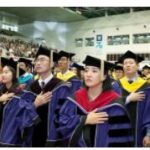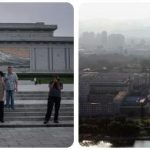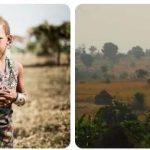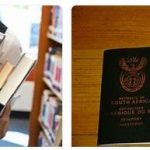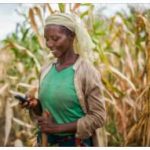South Korea: Various travel information
Formalities, visas
German, Austrian and Swiss citizens need a valid passport to enter Korea. In the case of children, it is sufficient if they are entered as an accompanying person in one of the parents’ passports. German, Austrian and Swiss citizens can enter the country as tourists for stays of up to 90 days without a visa.
Local currency, import and export of foreign currency
The national currency of South Korea is the
Won (KRW) = 100 Chon.
Foreign currency such as local currency may be imported up to an amount of the equivalent of 10,000 US dollars. Any additional amounts must be declared. Travelers carrying foreign or Korean currency worth more than US $ 10,000 require approval from the Central Bank of Korea or customs.
Souvenirs, customs regulations
In South Korea you can buy made-to-measure clothing and fabrics such as silk. Gemstones and jewelry are also great souvenirs. Traditional Korean goods include pottery, lacquerware, wood carving and wickerwork.
Any valuables must be declared upon entry into South Korea. There is an import ban for narcotics, weapons, explosives, plants, pornographic images of all kinds, films, audio or video recordings and products from communist countries. Antiques and valuable works of art may only be exported from South Korea with permission.
Goods are duty free
- Goods purchased outside of Korea with a total value not exceeding US $ 400
- A bottle of alcohol (not over 1 liter)
- 200 cigarettes
- 50 cigars or 250 g tobacco
- Two ounces of perfume
How do you get to South Korea?
The quickest way to get to South Korea is by plane. The South Korean airlines are called Korean Air (www.koreanair.com) and Asiana Airlines (us.flyasiana.com).
Travel in the country
Air connections The national airline Korean Air operates between Seoul and all major cities and Cheju-do Island.
Railway
All major cities can be reached by railway. Information from the state railway company “Korean National Railroad” is available at www.korail.go.kr.
Bus
The bus network is well developed. Intercity buses connect the larger cities with each other.
Roads
South Korea’s road network is well developed and has highways and country roads.
Car, rental
car Rental cars are available in the larger cities.
Ferry connections
There are ferry connections from Pusan and the cities of Geoje, Tongyeon, Donghae, Incheon, Boryeong, Gunsan, Gyeokpo, Yeoso, Mokpo and Wando as well as connections from Jeju Island.
Taxis
Taxis are a good form of transportation in South Korea because they are cheap and easy to get to.
Traffic rules
To avoid trouble with the police or even the courts, drivers should strictly adhere to the traffic regulations in force in the country. Regardless of the information given here, it is advisable to obtain more detailed information from the ADAC, the AvD or the South Korean traffic clubs.
Top speeds
- Urban: In built-up areas there is a speed limit of 60 km/h.
- Country roads: There is a speed limit of 80 km/h on country roads.
- Motorways: There is a speed limit of 100 km/h on motorways.
In addition, it is of course necessary to pay attention to the current local speed limits, which are indicated by traffic signs.
Blood alcohol limit
The official alcohol limit for drivers of motor vehicles is 0.5.
International license plate
The international license plate of South Korea is:
| ROK |
Tourist office
Representation of the Korea Tourism Organization in Germany
Baseler Str. 35 – 37
60329 Frankfurt am Main
Tel: 0049 – (0) 69 – 23 32 26
0049 – (0) 69 – 23 49 73
Email: kntoff@euko.de
Web: http: //german.visitkorea.or.kr/ger/index.kto
Infectious Diseases
In South Korea, the following infectious diseases, which do not or rarely occur in Central Europe, are to be expected:
- Malaria, there is only a rather low risk of infection with malaria on the border with North Korea, namely in the provinces of Kyonggi Do and Kangwon Do. Only tertian malaria occurs.
- AIDS, HIV
- Lyme disease
- Cholera, an infection risk only exists for travelers who can come into contact with polluted water or contaminated food.
- Intestinal infections from contaminated food or water, including amoeba, lamblia, salmonella, shigella and worm infestation, as well as all kinds of viruses and bacteria.
- Typhus,
- Hepatitis A and B, an infection with hepatitis B, is only possible in people who can come into contact with blood or those who are looking for sexual contact.
- Japanese encephalitis
- Polio, polio
- tetanus
- rabies
- Typhoid fever, an infection risk only exists for travelers who come into contact with polluted water or contaminated food
Recommended vaccinations
when traveling to South Korea, the following vaccinations recommended:
- Cholera, but only among travelers who may come into contact with polluted water or contaminated food.
- Diphtheria, a vaccination against diphtheria should always exist, also in the home country.
- Hepatitis A and B, vaccination against hepatitis B, is only required for people who may come into contact with blood or who are looking for sexual contact.
- Japanese encephalitis
- Polio, polio, vaccination against polio should always exist, also in the home country.
- Tetanus, a vaccination against tetanus should always exist, also in the home country.
- Typhoid, but only in travelers who may come into contact with polluted water or contaminated food.
Vaccination requirements There are no vaccination regulations when entering or staying in South Korea.
Malaria prophylaxis
When traveling in the country, it is advisable to undergo malaria prophylaxis. If the side effects seem questionable to you, you should at least have a “stand-by preparation” with you.
South Korea: Diplomatic missions
Representations of South Korea in Germany
Embassy in Berlin
Stülerstraße 8-10
10787 Berlin
Tel.: 0049 – (0) 30 – 260650
http://overseas.mofa.go.kr/de-de/index.do
German representations in South Korea
Embassy of the Federal Republic of Germany in Seoul
308-5, Dongbinggo-dong, Yongsan-gu
Seoul 140-816
Tel: 0082 – (0) 2 – 748 41 14
Email: info@seoul.diplo.de
Web: www.seoul.diplo. de
Honorary Consulate of the Federal Republic of Germany in Pusan
24-2 bonzi, Daechangdong-1-ga, Jung-gu
Pusan City 600-101
Tel: 0082 – 51 – 441 41 12
Austrian representations in South Korea
Austrian Embassy in Seoul
Kyobo B/D., 1, Jongno-1-Ga, Jongno-Gu
Seoul 110-714
Tel: 0082 – 2 – 73 29 071
Email: seoul-ob@bmeia.gv.at
Web: www.aussenministerium.at/seoul
Representations of South Korea in Austria
Embassy of the Republic of Korea in Vienna
Gregor-Mendel-Straße 25
1180 Vienna
Tel: 0043 – (0) 1 – 478 19 91 – 0
Email: mail@koreaemb.at
Web: aut.mofat.go.kr/eng/eu/aut /main/index.jsp
Honorary Consulate in Graz
Hans-List-Platz 1
8020 Graz
Tel: 0043 – (0) 316 – 71 54 55
Email: helmut.list@avl.com
Honorary Consulate in Klagenfurt
illacher Strasse 1a, 14th floor
9010 Klagenfurt
Tel: 0043 – (0) 463 – 550 56
E-Mail: office@burger-scheidlin.at
Honorary Consulate in Salzburg
Alpenstr. 61
5020 Salzburg
Tel: 0043 – (0) 662 – 63 86 600
Email: rudolf.aichinger@aon.at
Honorary Consulate in Linz
Ottensheimerstraße 30A
4040 Linz/Urfahr
Tel: 0043 – (0) 50 – 620 20 40
E-Mail: peter.neumann@engel.at
Swiss representations in South Korea
Swiss Embassy in Seoul
32-10, Songwol-dong, Jongno-gu
Seoul 110-101
Tel: 0082 – 2 – 739 95 11/-12/-13/-14
Email: seo.vertretung@eda.admin.ch
Web: www.eda.admin.ch/seoul
Consulate in Busan
5, Daegam-Ri, Sangdong-Myon
Gimhae-City Gyoungnam
Tel: 0082 – 55 325 10 01
Representations of South Korea in Switzerland
Embassy of the Republic of Korea in Bern
Kalcheggweg 38
3000 Bern 15
Tel: 0041 – (0) 31 – 356 24 44
Email: swiss@mofat.go.kr
Consulate in Zurich
Alfred-Escherstrasse 50
8022 Zurich
Tel: 0041 – (0) 44 – 625 30 50
Email: martin.senn@zurich.com

